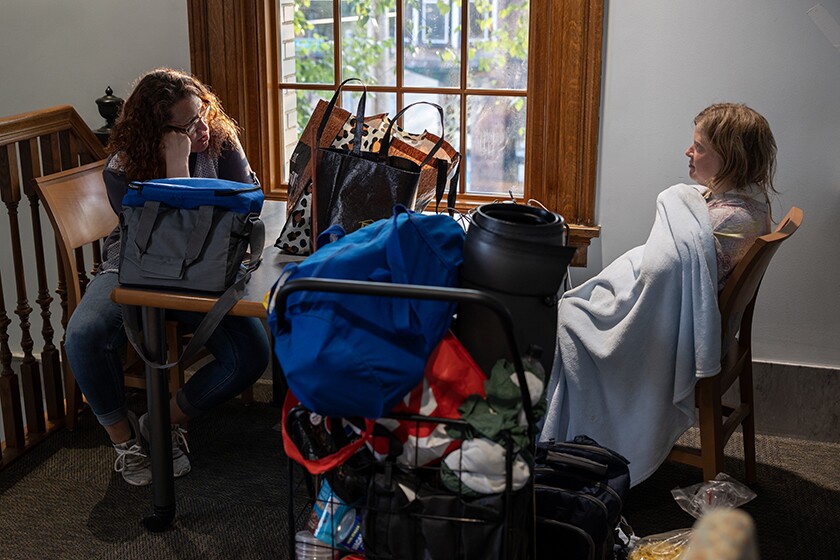
(Photographs by David Kidd/Governing)
By six o’clock, 20 volunteers have arrived at the low-slung, featureless building that houses the county’s homeless and prisoner re-entry services. A promised dinner is delayed because Jordan Conner, a deputy coroner and tonight’s chef, is locked out of his house where all the food happens to be. His wife Misty, the county’s “housing navigation coordinator,” is in charge of tonight’s count. It only takes a few minutes for Misty to go home and come back with her husband and the food.
Soon after the Conners return, a mix of county employees and volunteers — many of them formerly unsheltered — are lined up in a conference room to sample the buffet. Among them are Scott Faith and his mixed beagle Delilah. Scott and Delilah were homeless over the past winter and spring. “Nobody knows what it’s like until it happens to them,” he says. He credits Misty Conner for getting him and his service dog off the street and into an apartment. They are here tonight to return the favor.

After making short work of the hot dogs, hamburgers and macaroni salad, everyone heads for a side door, outfitted in matching green fluorescent vests. Those who need help are schooled on the use of a new phone app designed to aid in the count. Paper instructions are available to anyone not willing or able to use their phone.
Misty Conner is stationed by the door as they file past into the bright late afternoon sun. She sends them off with a few final instructions. “There’s ponchos if you want to give out those,” she says. “And bug spray. Use the app as much as you can. If you use the paper, leave them on my desk and I will enter them tomorrow. Turn on your location on your phone.”
Soon they are gone, in cars and on foot, having divided themselves up into groups of four.

A Second Attempt
Tonight isn’t the first time Franklin County has tried to count its homeless population. An attempt was made late in January, coinciding with the nationwide point-in-time count that’s conducted annually. “This year sucked,” says Misty. “It was horrible. A snowy, cold, wintry mess.” There were several falls as the counters made their way across icy fields and frozen hillsides. One volunteer suffered a broken arm, requiring surgery. He is not here for tonight’s count.
For all their efforts, not one homeless person was identified that night in January. Misty surmises that everyone had gone to the local shelters or otherwise found a place to stay inside. She hopes that tonight’s warm-weather count will reveal the numbers of unsheltered people that she knows are out there.
“Homelessness is getting worse,” Misty says. “A lot of the eviction protections have stopped after COVID. I’m the one that gives out the sleeping bags and the tents. Last August I gave out 41. That’s why we decided we were going to do a summer count. We went through a hundred some tents in a year.”

The group spends 45 minutes scouring the wooded perimeter and checking row after row of orange garage doors. The only person they encounter is a lone man tending to his stored belongings. The group then decides to drive over to another location where the homeless are known to congregate. Thirty minutes later they are picking their way through a wooded area next to a Cracker Barrel parking lot. They find recently filled dog food dishes and some empty bottles, but no people. A lone, worn-out car is parked on the lot’s fringes, facing the trees. A look inside confirms that it is someone’s home.

Across the room, one of the volunteers has found September, a young woman widely known to be without a home. September has wrapped herself in a blanket against the chill of the building’s air conditioning. “Are you staying with family now?” the volunteer asks.
“No,” says September. “I refuse to stay with them. When I was staying in the motel with them, I was being treated like dirt. I was being abused. All that stuff. I’m not going back there.”
They make plans for September to stop by Misty’s office to pick up some supplies. “All right, madam. I’ll see you on Thursday. If you need anything else, you let me know.”

Happy to have an audience, Norman regales the group with tales of his recent exploits and shares his plans for a new tattoo. He and Misty banter back and forth before he declines her offer of help, preferring to stay outside for the time being.
While Norman holds court, volunteer Rusty Rouzer listens patiently off to one side. Rusty has twice lost his home and family. Once when his wife died and again when his mother passed away. “I told Misty I was tired of living out in the woods all the time,” he says. “She helped me get an apartment. Now I’m giving back.”

Related Articles












